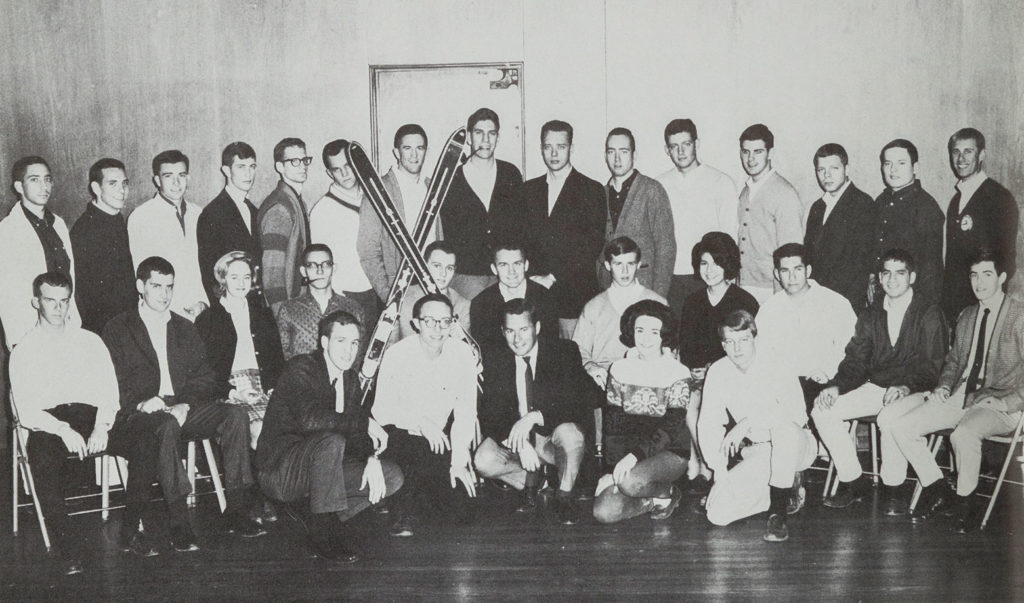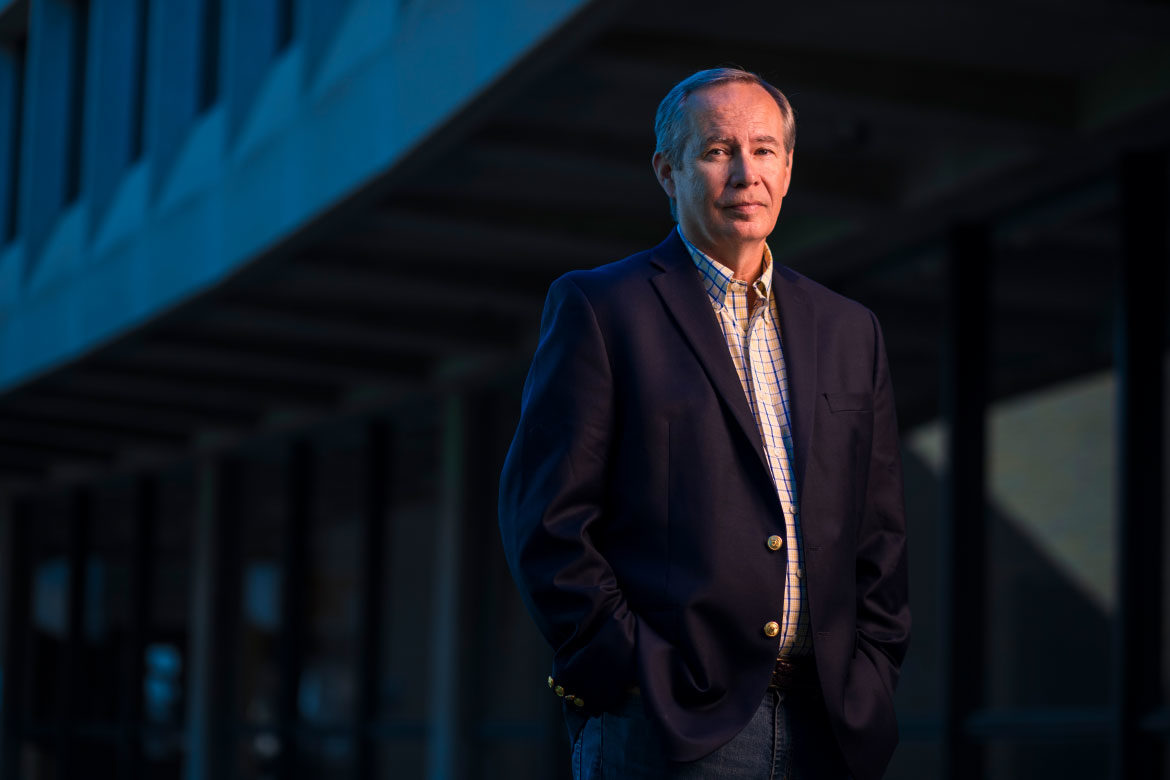Sometimes a simple step can lead to extraordinary and unexpected places, as Michael Bishop (MS ’83) can attest. Twenty years ago, when he volunteered to help a friend with research, Bishop couldn’t have imagined that his life would be consumed with trying to solve a murder that police said had already been solved.
Bishop had enjoyed carrying out research programs as a graduate research assistant at UT, where he earned a Master of Science in agricultural economics. So in August 1997, when a friend told him about a project to document 40 notorious crimes and events in Nashville’s history, Bishop offered to lend a hand and began spending lunch hours at the city archives.
On his third visit, in an uncatalogued box of old police attendance reports and training logs, he discovered a manila folder labeled “Paula Herring.” It was filled with documents and crime scene photos from a widely publicized Nashville murder in 1964 that was, coincidentally, one of the stories on his friend’s list.
Herring was a first-year UT student, a popular rising leader, home for the weekend in Nashville’s Crieve Hall suburb. She was shot twice in the back in her family’s living room while working on a reading assignment and babysitting her six-year-old brother. John Randolph Clarke, the son of a judge in Jonesborough, Tennessee, was arrested for the murder a few days later and convicted the same year. He died in 1986, 10 years after his release from prison with a commuted sentence, maintaining his innocence to the end.
‘This Story Has Chosen Me’
Intrigued by the story, Bishop began tracking down former neighbors who might remember something about the young woman’s murder. Expanding his search, he quickly learned that Herring’s father, Wilmer Herring, had been poisoned in 1960 and his death ruled a suicide. Her mother, a nurse named Jo Herring, had later moved to Texas and died at age 52 of liver failure in 1976.
After speaking with the only remaining member of the family—Herring’s younger brother, Alan, who had slept through the attack—Bishop began digging deeper. His research led him to classmates and others who had known Paula Herring at UT, as well as the transcripts from Clarke’s trial. As he talked to more people and read more accounts, he began to see a growing number of inconsistencies and gaps, leading him to suspect that Clarke was not the killer—a suspicion that was borne out over the many years of research that followed.
“I wasn’t certain of where it was leading me,” he says. “I just knew there were a number of—I’ll call them unusual occurrences—that made me think, ‘I’m not sure if I’m picking this story to research or if this story has chosen me to do the work.’”
Along the way, he learned to balance what had essentially become a second job with his family life and career. Bishop, a sales executive with a health care learning company, travels frequently in the course of his work. Being on the road gave him plenty of time to work on the project. “I’d start working after dinner, and I might work until one in the morning writing notes, writing up interviews, trying to figure out who people are and where they were.
“And it turned out I didn’t need a lot of sleep—I can get by on five hours,” he says.
Eventually, he found compelling confirmation that Clarke was not the killer as well as evidence pointing to a coverup involving highly placed city officials.
As he began to realize the scope of his discoveries, Bishop began taking steps to protect himself and to prevent people from concealing information. “I decided the best thing I could do was to tell as few people as possible what I was doing,” he says. “I just quietly went around asking people if they could help me—‘Do you remember anything about this?’”
Most of his family didn’t even learn about the project until the book was being prepared for publication.
After a detective who’d worked on the original investigation pointedly asked whether Bishop was researching the case or reinvestigating it, Bishop sat down with a documentary filmmaker and told her the whole story over a long breakfast. “I said, ‘If anything happens to me, come see my wife—she’s got all the files.’”
Year after year he persevered in his work. “I didn’t think of it so much in terms of a commitment—I was thinking of it in terms of ‘I know something is really wrong here,’ he says. “It was ‘If I don’t do something about this, I’m not sure I want to wake up and see myself every day not having told this girl’s story.’”
Amateur Sleuthing
While Bishop’s level of commitment and research skills were exceptional, his desire to get to the truth was not, according to Carolyn Hank, an assistant professor of information sciences in the College of Communication and Information who contributed to the new BS program in information sciences that will be launching this fall.
We may think of amateur sleuthing as a new phenomenon, especially in its newer forms of cyber sleuthing and crowdsourced sleuthing, but it’s “something that’s been going on since we’ve had recorded information—to seek out and evaluate sources and apply them,” Hank says.
Bishop’s two decades of research began in the earliest days of the internet, when most information was still held in libraries and archives and often required an expert mediator to navigate, and reached into the Web 2.0 era of interactive communities and social media. It’s a change that, according to Hank, “has opened the door for everybody to be a seeker—and not just a seeker but a publisher or author or contributor—to that very extensive tapestry of both good and bad information.”
She cites Bishop’s work, thoughtfully assembled over many years, as a great example of a nonprofessional “going down a rabbit hole” with a positive outcome. In other cases, such as the Boston Marathon and Atlanta Olympic Park bombings, a quicker and more careless pursuit of information can lead to misidentification of suspects and ultimately cause harm. “And this isn’t just everyday citizen Twitter users,” she says. “It’s also media organizations.”
Eventually Bishop ended up with a 400-page manuscript in a three-ring binder, which he took to a lawyer to read and advise him about whether it could, in his words, “see the light of day and me not be murdered or sued.” She cleared it after recommending a few changes. She also suggested that he contact some literary agents, telling him “They’re going to want this story.”
Although it’s almost unheard of for a first-time writer, Bishop quickly found an agent and publisher to take on the book. A Murder in Music City: Corruption, Scandal, and the Framing of an Innocent Man was published in 2017 and is now in its fourth printing. The book has garnered stellar reviews and a 4.7-star rating on Amazon. The reception, Bishop says, has been “far better than I could have dreamed.”
Since then, he’s had speaking engagements and book signings across the country. At Nashville-area events he routinely meets people with ties to those involved in the story, including Herring’s classmates and teammates as well as former students of Clarke’s wife, who taught high school biology. Others remember getting their childhood vaccinations from Herring’s mother, a public health nurse. Speaking at a Baptist church near the Crieve Hall neighborhood, Bishop learned that it was the church the Herring family had attended, and members of the congregation could vividly recall both Paula Herring’s and her father’s deaths.

Paula Herring, seated third from left, was a founder of the UT Ski Club. (Volunteer Yearbook, 1964)
“It’s an honor to meet those people, but it’s also pretty sobering to realize—you write something today, and it has an ability to change how people go back and view history.”
Bishop has helped honor Paula Herring by creating a memorial scholarship in her name, supported by sales of the book. The scholarship is awarded to a graduate of her alma mater, Overton High School in Nashville, who has a GPA of at least 3.0 and has lettered in an intercollegiate sport. (Herring played basketball and tennis and was captain of Overton’s basketball team in her senior year.) It was awarded for the first time in May.
He’s considering the possibility of petitioning to formally clear Clarke’s name, which would require a recommendation for a posthumous pardon made by the state parole board and signed by the governor. It’s a complicated issue because at least one of the people whose name was changed in the book—the daughter of a woman involved in the story—would likely have to be publicly identified. “She’s had enough trauma in her life,” he says. “She doesn’t need people chasing her down.”
Given Bishop’s tenacity in pursuing Herring’s case, it’s unsurprising that he’s regularly approached about unsolved deaths, suspicious suicides, and people who have gone missing.
He responds with guidance and suggestions for getting in touch with people who may be able to help.
There’s one other case that stays on his mind—one that comes from his own history. Bishop grew up near Gadsden, Alabama, where his grandparents were sharecroppers and his parents had little education but a deep love of learning and reading.
“My mother’s much younger sister—my 18-year-old aunt—was living with us and went missing when I was six,” he said. “She ended up going to prison for first-degree murder in Alabama.
“Her story is one that I hope I’ll get to tell at some point.”


3 comments
I would like to see if Michael Bishop would be willing to attend the Edmondson Pike Library Book Club on October 3, 2019 at 10am. We will be discussing his book, Music in Music City, and we would love to have him help us. Carolyn Nessen, October book club leader.
If you can please email me at dspencer@utk.edu with your contact info, I’ll be glad to pass along the request.
The story was very fascinating and exciting.